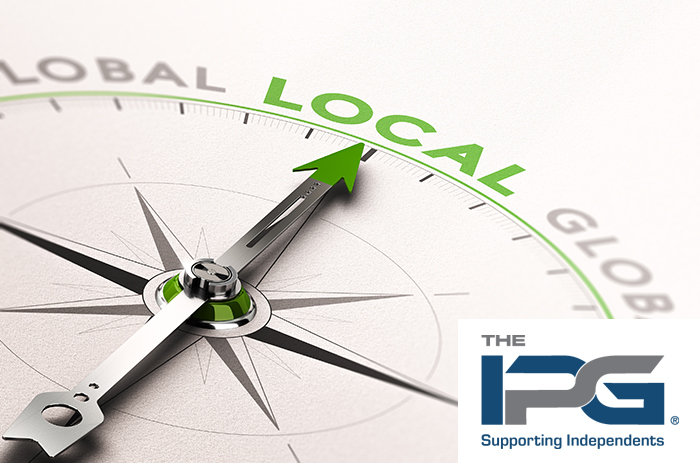Tom Bigley
JOIN US 9 DECEMBER FOR THE WPC VIRTUAL GENERAL MEETING We invite you to join us for the World Plumbing Council General Meeting, to be held virtually on 9 December from 6 to 9 p.m. (U.S. Eastern Standard Time). The meeting is FREE to all who wish to attend. You must register beforehand; click here to register. The meeting will begin with the business portion of the WPC, followed by a report highlighting the work WPC has done in partnership with the International Water, Sanitation & Hygiene Foundation (IWSH). At 7 p.m., the World Health Organization (WHO) will join us to discuss the global progress on WASH and waste in health care facilities. The meeting will conclude with a panel discussion on plumbing system implications related to the COVID-19 pandemic. Tune in to hear from experts from academia and industry on the latest research, risk management practices and guidance documents. Pete DeMarco of the International Association of Plumbing and Mechanical Officials (IAPMO) will moderate the discussion. Panelists will include Dr. Michael Gormley of Heriot Watt University, Dr. Andy Whelton of Purdue University, and Christoph Lohr of IAPMO. More details may be found here: www.worldplumbing.org/wpc-general-meeting-2020/
46TH WORLDSKILLS COMPETITION POSTPONED 2021 named the year of innovation On Nov. 3, WorldSkills International officially announced the postponement of WorldSkills Shanghai 2021 by one year due to the COVID-19 pandemic. WorldSkills International has communicated and collaborated closely with its members, competition organizers, partners and stakeholders throughout 2020, and recently hosted a series of meetings with all stakeholders to transparently and collaboratively consider all possible scenarios around risk management and risk mitigation. This decision was made based on facts, educated and informed forecasts, lessons learned from other events and organizations, and strategic perspectives built around what is best for all stakeholders. WorldSkills International believes an early and clear decision is best for all stakeholders. It provides a much higher degree of certainty for everyone that then allows planning, managing and recalibrating the next 12-24 months (and the future beyond that). This decision means that all future events will also be moved by one year, so WorldSkills Lyon 2023 will move to 2024. WorldSkills China and the Municipality of Shanghai fully support the postponement and appreciate the strong partnership with WorldSkills and its members and partners, and are committed to an event that is full of innovation and wide-reaching impact. The rescheduled date has not been finalized, but is expected to be in October/November 2022. WorldSkills France and the WorldSkills Lyon 2023 Competition Organizer also fully support the postponement and future cycle changes due to their understanding and respect for the investment of a competition host and the benefits and legacy achieved. Postponing the competitions allows for the selection, training and proper celebration of the achievements of the young, skilled champions. It also allows members to “reboot” their national activities and programs in 2021. “Our competitors represent the skilled talent that has been essential in the global response to the pandemic, demonstrating without a doubt that skills change lives,” said Chris Humphries, president and chair of the board. “We are grateful for the support of both WorldSkills China and WorldSkills France and their organizing teams, who have worked closely with WorldSkills International to reach what we all believe is the best solution to preserve the integrity and spirit of the competition.” WorldSkills members’ local and national competitions were put on hold throughout 2020, delaying the selection and training of teams to participate in WorldSkills Shanghai 2021. Members around the world have already begun planning and hosting alternative competitions and online training programs to continue the work of encouraging young people to take up vocational education and training. “We believe more than ever that skills and young people will lead us down the road to global economic recovery and prosperity,” said David Hoey, CEO of WorldSkills International. “Alongside our members and global partners, we will use the next 12 months to continue connecting with young people through a series of exciting and innovative programs that will embrace a year of innovation and inspire more young people to take up skills.” The 46th WorldSkills Competition will be hosted in Shanghai, China, in 2022, featuring more than 1,400 competitors from more than 60 countries and regions, competing in over 60 skills. WorldSkills Competitions create a global platform to develop help young people who want to change their lives and the fortunes of their communities and societies.
EVERYONE IS TALKING ABOUT HYDROGEN Submitted by the Plumbing Industry Climate Action Centre |
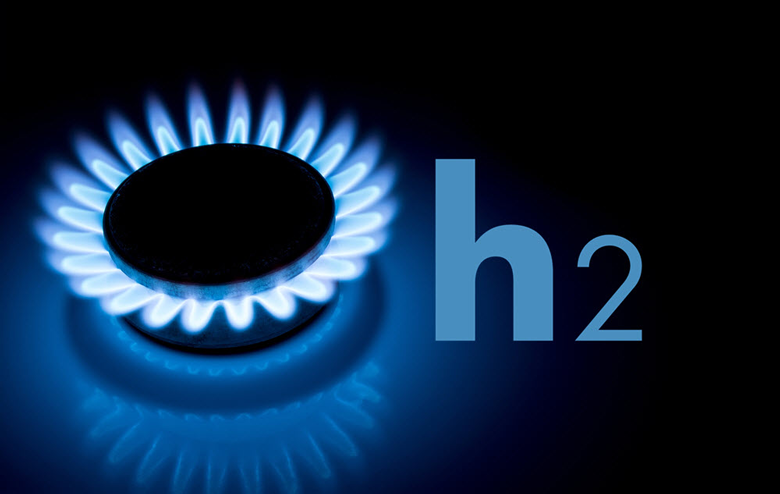 |
Everyone is talking about hydrogen — in the scientific community, in parliaments worldwide and around board tables. In Australia, there is growing consensus that hydrogen will be a key feature of a low-emissions future. But what do we know about hydrogen energy? How is it created and utilized? What needs to happen to realize the potential of hydrogen and what does all this mean for the plumbing industry? Hydrogen is the most abundant element in the universe, bound into many common substances including water, which is a compound of oxygen and hydrogen. Like natural gas, hydrogen can be used to heat buildings and power vehicles. Unlike natural gas or petrol, when hydrogen is burned there are no CO2 emissions. The only by-products are water vapour and heat. A well-functioning hydrogen industry has huge potential to deliver significant economic, jobs, fuel security and environmental benefits to Australia. Some of Australia’s most important trading partners, such as Japan and South Korea, are committed to transitioning their economies to clean hydrogen. Hydrogen is potentially both a major new export, with the potential to generate billions for the Australian economy, and a major new domestic energy source. From transforming transport, to providing secure, affordable and clean energy for industry and households, the potential of an Australian hydrogen industry is massive. The challenge is to put in place the necessary policy settings, regulatory incentives, infrastructure, and training to enable the potential of hydrogen to be realised. About hydrogen energy Green hydrogen is produced by splitting water molecules into hydrogen and oxygen through a process called electrolysis. This process uses an electrolyser — a vat of water containing two electrical nodes (one being negative and the other positive), and a separate “exit valve” near each node. Conducting an electric current from one node through the water to the other node causes a chemical reaction in the water. The water molecules (H2O) split into hydrogen and oxygen (H2 and O2). The hydrogen molecules attract toward the negative node and the oxygen molecules attract toward the positive node, meaning separate exit valves make it possible to collect both the hydrogen and the oxygen. The hydrogen can be used as a fuel, while the oxygen can be utilised for industry and health sector purposes. Producing hydrogen this way requires significant amounts of electricity, and so the extent to which this form of hydrogen production is genuinely environmentally friendly is determined by the power source of the electrolysis process. Where it is powered by solar, wind or hydro-electricity, this form of production is 100 percent renewable and non-carbon emitting. The water required to produce hydrogen can also come from rainwater capture or water reuse facilities. Carbon capture and storage hydrogen, or brown hydrogen, can be produced from fossil fuels, such as brown coal and natural gas, both abundant in Australia. However, the processes to make hydrogen from fossil fuels all produce unwanted CO2 emissions as a by-product. |
 |
Realising the potential of hydrogen The industry development phase is well advanced. There are more than a dozen pilot projects around Australia that are considering ways to add hydrogen to the mix of natural gas for domestic use. In South Australia, the state government has installed a large hydrogen electrolyser that will allow hydrogen to be extracted from water using renewable energy and pumped through the natural gas network into hundreds of homes in the southern suburb of Mitchell Park. If projects like this prove their viability and the demand for hydrogen grows, there will be extensive opportunities for gasfitters to play a critical role in the installation and maintenance of hydrogen alongside or in place of traditional gas such as natural and LPG. In the Australian domestic market, there are many opportunities to use hydrogen as an alternative to natural gas. Progress in hydrogen technologies will make these opportunities increasingly attractive over time. Hydrogen can be safely added to natural gas supplies at 10% by volume without changes to pipelines, appliances or regulations. Over time, and with modifications to the existing gas networks and appliances, hydrogen can completely replace natural gas for domestic cooking, heating and hot water. In the longer term, hydrogen can be used in high temperature manufacturing processes such as in steel, fertilizer and cement production that currently have high CO2 emissions. Hydrogen can be stored as a compressed gas in high-pressure tanks, and in pipelines, or as a liquid at below freezing temperatures. That compressed hydrogen can be used for a variety of applications where gas is not reticulated. In places like the Australian state of Victoria, where there is an extensive reticulated gas network, that network can effectively become a giant battery, storing renewable energy. Victoria has 1,900km of gas transmission pipes in its Principal Transmission System (PTS), covering Melbourne and central Victoria. Existing infrastructure is expected to be reliable for carrying blends of gas with 10% hydrogen, but moving beyond 10% is expected to require upgrades and retrofitting pipes and other fittings. Modifications to the existing piped infrastructure would be required; however, undertaking the necessary upgrade work would require relatively low new capital expenditure or disruption to public infrastructure. Hydrogen molecules are smaller and lighter than natural gas, so preventing leaks in pipes full of hydrogen requires different specifications for most pipes and fittings. Hydrogen pipes must be made from (or lined with) corrosion-resistant material. Steel does not suffice because the hydrogen embrittles the steel, causing breaks and leaks. High-purity stainless steel, or pipes lined with carbon fiber or polymers, are required. High-quality industry-led training is the key The plumbing and gasfitting workforce — both current and future — will be key to Australia being able to reach its hydrogen potential. As Australia’s Chief Scientist Dr. Alan Finkel AO said in his report to the Council of Australian Governments in December 2018 (A Proposal for a National Hydrogen Strategy) developing a hydrogen sector in Australia will require a range of factors to be working together, including training, which he said was the key. The Plumbing Industry Climate Action Centre (PICAC), IAPMO and other industry partners are doing the research to develop the best, most effective training materials to equip existing plumbers and gasfitters, and the next generations, with the skills needed to ride the hydrogen wave. PICAC is the natural home for hydrogen training and has already received significant funding support from the Queensland Labor government to develop a Hydrogen Centre of Excellence at their Beenleigh campus. Planning is underway to develop a similar facility in Victoria. Hydrogen energy does not come without risk. Hydrogen is highly flammable with different burning properties and a naturally clear flame. Hydrogen will likely need to have color added if it is to be used in domestic settings. Hydrogen can also destroy steel, so household gas fittings and hot water installations may need to be altered to prevent corrosion. The risks and how they can be safely managed are part of what are currently being researched. Importantly, with this research being conducted now, the plumbing industry will have access to the best hydrogen energy training available in Australia and potentially the world. With safe hydrogen work practices in place, and strategies in place to protect the community from any potential harm, our industry will be at the forefront of working with an energy source that will provide great benefit to us all.
FLIP ‘N’ FLUSH URGES PUBLIC TO CLOSE THE LID Submitted by Chartered Plumbing and Heating Engineering Institute of (CIPHE)
The body for the plumbing and heating industry, the Chartered Institute of Plumbing and Heating Engineering (CIPHE), is advising everyone to flip down the toilet seat before flushing to help stop the spread of coronavirus, germs and other nasties spread by “toilet plume.” Toilet plume arises when lavatories are flushed. Turbulence from the toilet bowl can enable tiny droplets and aerosol particles to be released into the air. It had been generally accepted that while there was a small risk of transmission of illnesses, for the healthy and those with good hygiene, it would pose few problems. Then coronavirus struck. According to current evidence, coronavirus is primarily transmitted between people through respiratory droplets and contact routes. Airborne transmission is possible via aerosols. With some coronavirus patients experiencing symptoms including diarrhea and vomiting, it’s been discovered the virus survives in the digestive tract, making fecal–oral transmission also possible. Additionally new research by Yun-yun Li, Ji-Xiang Wang and Xi Chen warns that 40-60% of toilet plume particles can reach to a height of 106.5 cm above the ground — well in excess of the height of a toilet seat — enabling the spread of particles on nearby surfaces. During computer simulations, particles could also stay suspended in the air long enough to be breathed in post-flushing. This has big implications both in the home, where family bathrooms are also used for activities such as teeth brushing, and public lavatories, where multiple users can come into contact with airborne particles and contaminated surfaces. CEO of the CIPHE, Kevin Wellman said, “While this latest research still needs to be proven in real-life situations, we should take all the measures available to help stop the spread of coronavirus and other illnesses such as staphylococcus and E. coli. “Simply closing the lid when flushing the toilet can remove any associated danger of toilet plume. Needless to say, this should always be backed up by a vigorous hand washing routine. For those wanting to be ultra careful, cleaning the toilet seat before you use it can also reduce the risk.” Find out more about the flip ‘n’ flush campaign at www.ciphe.org.uk/flipflush |
 |
The International Water, Sanitation and Hygiene Foundation (IWSH) is excited to announce a new partnership with the Plumbers Association of Zambia (PAZA). The memorandum of understanding (MOU) centers on the Lusaka WASH Academy College (LWAC), the hub for PAZA activities and outreach across the region. LWAC has recently moved premises, relocating to a new site within the African Future College in Lusaka, and upgrading accreditations with the Technical Education, Vocational and Entrepreneurship Training Authority of Zambia (TEVETA). IWSH has provided a donation toward these registrations, plus the purchase of tools and resources for the upcoming academic year. PAZA and IWSH now aim to collaborate further in the areas of vocational education and training development, women’s empowerment, codes and standards development, public health awareness, and other outreach activities that support the sustainable delivery of water, sanitation and hygiene services to underserved populations and communities in Zambia. “As fellow members of the World Plumbing Council, we are pleased to connect officially with PAZA and support the development of the LWAC for the academic year ahead,” said Seán Kearney, IWSH managing director. “Our aim is that by helping bridge the gap between the industry and the classroom — promoting quality skills training, and PAZA’s own training institute focusing specifically on water related programs — our organizations can build further capacity together.” Alongside plumbers, LWAC also welcomes individuals across the wider industry, including suppliers, manufacturers and those who may wish to upgrade their credentials. PAZA’s operation of LWAC will contribute to the delivery of quality skills training in all parts of Zambia, and at the wider regional level. Engagement with TEVETA will improve the curriculum, specifically for plumbing/water operation and supply and extend from Craft certificate to Diploma level. “Our partnership with IWSH will help PAZA develop plumbing standards, provide quality services, uphold plumbing professionalism, protect our members, and promote and encourage young people to choose the right careers for a better future,” said Moses Chongo, PAZA CEO and president. “We shall continue to engage other stakeholders, government agencies, non-governmental organizations, training providers, and education providers to bring positive ideas to contribute to the growth of the organization.” |
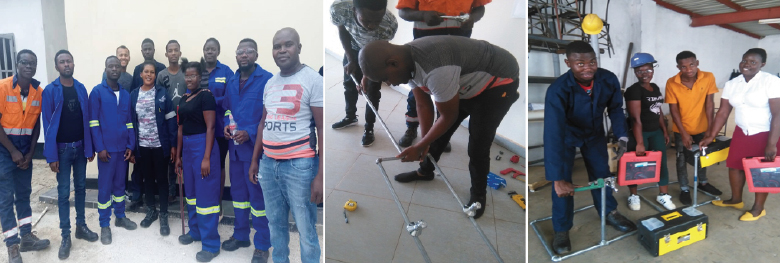 |
Lusaka Wash Academy College Students LWAC offers courses in Water Operation and Supply Technology, Plumbing and Water Supply, Environmental Health, Water and Sanitation, Water Supply and Electrical, Wastewater Treatment and Sludge Management Technology, and Water Quality Management. It expects to train 200-300 vulnerable youths each academic year, including community outreach projects that drill boreholes and build public toilets and bathrooms for schools, rural health clinics and community markets. Creating opportunities and supporting young Zambian women to advance in the plumbing trade is also a key PAZA objective. “It is very important, as a woman, to join the group of men in the plumbing and water industry,” said Violet Siansumo, Women’s Plumbing co-coordinator. Explaining how she joined water operation and supply as a student, Siansumo said, “It was a challenge. Some fellow women were discouraging me so that I cannot continue my studies because it’s a man’s industry. But I am now able to feed myself and my family, and my passion is to extend the same career to other women and support vulnerable young girls seeking a quality education and skills training in plumbing.” She said plumbing and water is the best career in life because she is able to understand the challenges of women in various communities, markets and other places. Many women have no access to safe and running water in their areas, and PAZA will introduce more young women to be trained as plumbers and water operators. |
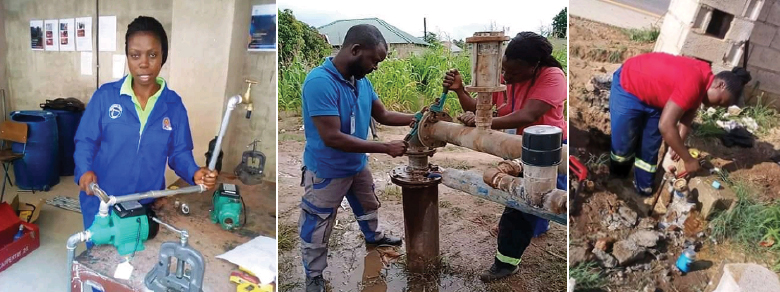 |
Violet Siansumo in the field. Western Province PAZA provincial Secretary Gloria Mooka said, “PAZA has changed a lot of lives and people’s mind set.” |
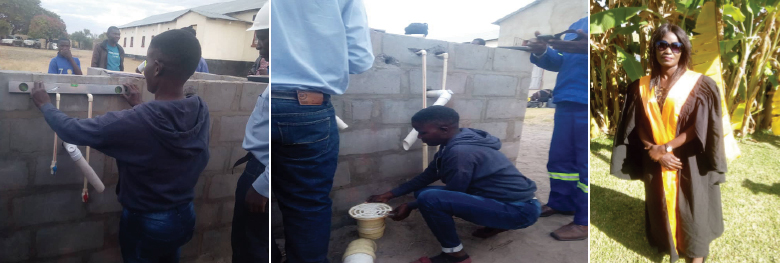 |
Gloria Mooka PAZA was founded in Lusaka in June 2019 and joined the World Plumbing Council the same year. With more than 80 members and growing — from a variety of backgrounds including plumbing, water operation and supply, HVAC, mechanical plumbing services, pipefitting, and water pump maintenance — the association is on an upward trajectory and well-positioned to continue its growth in the coming years, developing the plumbing industry in Zambia and the surrounding region. Visit www.iwsh.org for more information on The International Water, Sanitation and Hygiene Foundation. BUSINESS AS USUAL FOR GILL’S PLUMBING & HEATING |
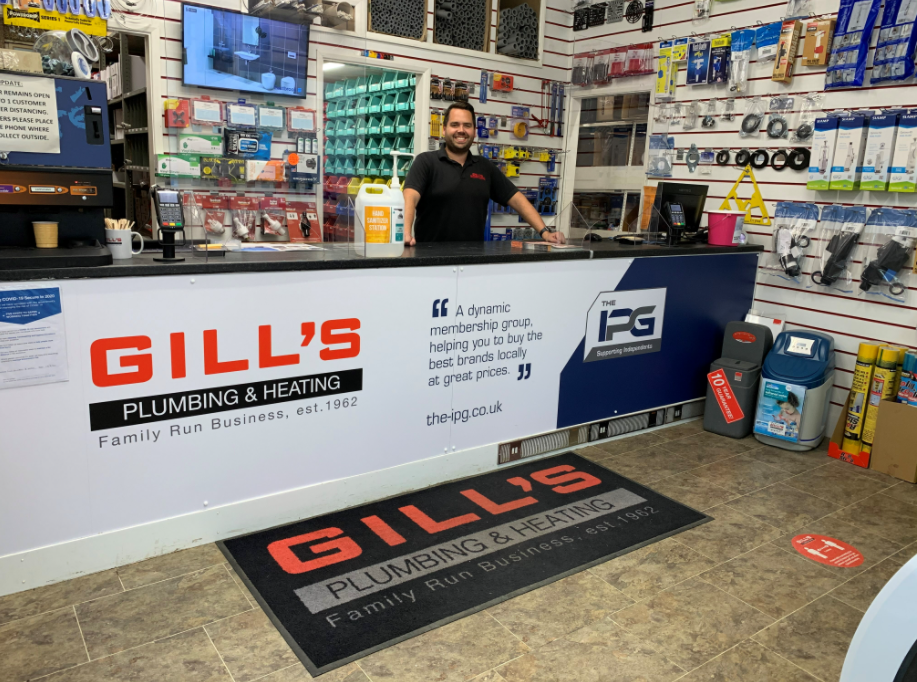 |
| Gill’s Plumbing & Heating, an IPG member based in Welwyn Garden City, has continued to respond to the current business landscape.
Gill’s began the year by rebranding the store inside and out, with new store signs clearly identifying them as an IPG member. It was looking great in the spring sunshine, and then COVID 19 arrived and dictated what happened next. Normally, there would have been a celebration and promotion, inviting customers to see the new-look store. However, Gill’s found itself in extraordinary times. In early March, whilst the trade counter remained open, footfall dropped dramatically and home installations that were booked in had to be postponed. When the country went into lockdown at the end of March, it became clear that businesses that could adapt quickly would have a better chance of flourishing again. Gill’s adapted to new customer requirements; plumbers and installers were still supporting their customers with emergencies, so it was important that the essential trade counter remained open. In addition, local households required water softener and salt, and Gill’s was delivering these essential products to the doorsteps of those who were self-isolating and vulnerable. It is often the small businesses that will adapt to a quick-changing business environment, and in this case, Gill’s modified its service to over-the-phone payment, safe collection, and deliveries, ensuring its customers were able to shop in their local area — which clearly demonstrates the importance of independent stores all over the country. Chris Kania, Gill’s managing director, also made some additional changes to the inside of his store, to keep staff and customers safe. Now a familiar sight in retail outlets, Perspex screens were installed across the counter, hand gel sanitizer was made available on entering the store, the showroom, office and warehouse, and visible social distance stickers were put on display – with only two customers allowed in the shop at any one time. It has never been so important to support the independent merchant in the heart of your community; many of them (like Gill’s) have been part of it for decades. The IPG has played its part in supporting its members. For example, during the early days of the pandemic, the common message published across its marketing channels highlighted those member businesses that remained open, advising opening times and the level of service they were providing. Chris said: “The IPG are an essential part of our business and during 2020 they offered vital advice and support.” He went on to say: “Throughout more recent weeks, business has picked up; as our customers have returned to work, they are seeing more homeowners about non-emergency work, confidence has grown in the new working conditions and their customers are happy to have tradespeople working in their properties again.” Homeowners are now visiting Gill’s for parts and to look at the bathroom showroom, and a booking system has been introduced to maintain social distancing. This part of the business has remained very positive, with many future installations in the pipeline. So, to coin a phrase, Gill’s, like many IPG members, has reached a new type of normal. As autumn falls they remain strong, having adapted their business in this ever-changing landscape, continuing to offer unrivaled service and unbiased and honest advice. As for the new look? It continues to be well received among the regular Gill’s customers. Chris commented: “We are proud to be part of The IPG, and to demonstrate this with our jointly branded store.”
LOCAL SHOPS FOR LOCAL PEOPLE….
|
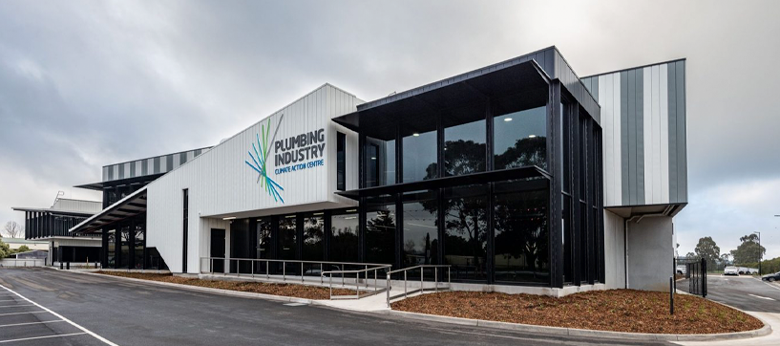 |
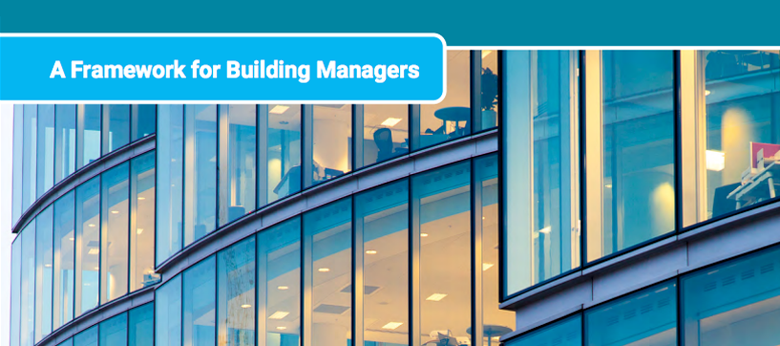 |
At a time when many buildings are not fully occupied due to COVID-19, the American Water Works Association (AWWA) and IAPMO have developed a guide to help building managers address water system stagnation. Stagnation within building water systems is a concern in periods of low or no occupancy. When water does not move through the system, water-quality issues may arise at an outlet, a group of outlets or throughout an entire building water system, causing potential health risks. Titled Responding to Stagnation in Buildings with Reduced or No Water Use, the guide “provides a decision-making framework for building managers to design responses to building water system stagnation,” said William Rhoads, a co-author of the guide and a post-doctoral researcher at Virginia Tech. Peter DeMarco, executive vice president of Advocacy and Research at The IAPMO Group, said the new document provides essential guidance at a crucial time. “As buildings reopen across the country, it will be critically important for building owners and facility managers to actively address water quality concerns in plumbing systems due to stagnation,” he said. “We appreciated the opportunity to work with Dr. Rhoads and the other authors on the development of this important guidance document.” Because of the many differences in building water system operation and design, one set of instructions is not appropriate for all buildings. The guide provides a framework for building managers and a resource that water systems can utilize in supporting the business community in their service areas.
WESTERN AUSTRALIAN GOVERNMENT TAKES ACTION ON COPPER THEFT Submitted by Master Plumbers and Gasfitters Association of Western Australia The Western Australian Government is bringing in new regulations to control the problem of copper theft, which has been a huge cost for plumbing contractors and others in the building and construction sector. Copper and copper alloys including brass and bronze will be regulated in a similar way to metals like gold and silver. The Master Plumbers and Gasfitters Association of Western Australia had been urging the government to tighten up the law. Theft of copper plumbing materials and products from building sites and finished buildings costs the association’s members hundreds of thousands of dollars every year. In many cases, the stolen material finds its way to scrap metal dealers, where it is sold for cash and helps to finance the illegal drug industry. Under the new regulations that take effect on Dec. 1 2020, anyone selling copper will have to produce identification. Scrap metal dealers will have to record all transaction details, including the personal details of sellers and provide reports to police. The government says these changes are just the beginning while it investigates a broader reform of legislation. WA Government media release: WA Police Force news: https://www.police.wa.gov.au/About-Us/News/New-Copper-Legislation
PLUMBING A PRIORITY AFTER SEVERE STORMS
Submitted by Master Plumbers’ Association of Queensland (MPAQ) In the wake of the recent severe storms, health and safety must remain a key priority for homeowners. Master Plumbers’ Association of Queensland (MPAQ) is warning people not to become complacent and to place plumbing checks at the top of the priority list along with electrical work. MPAQ President Kent Vickers said, “Checking the property’s plumbing, drainage, gas and roofing needs to be a priority after such events if public health is to be safeguarded. I would urge people now facing the daunting task of a post-storm cleanup to pay particular attention to those key plumbing issues that can impact health and safety.” Vickers said residents need to contact a licensed Master Plumber to check on:
Vickers said residents will also need to be cautious of downpipes that are connected to underground stormwater drains that may be blocked with silt. Any further rain may overflow from the gutters as the water cannot drain away, flooding the house. In the case of significant damage, where you may need to replace plumbing fixtures and/or fittings, people should be mindful that all plumbing work will need to be done by a licensed person. Residents and homeowners can contact MPAQ from Monday to Friday on 07 3273 0800 to locate a licensed Master Plumber in their area or visit www.mpaq.com.au/find-a-plumber. Consumers are also being told to beware of scammers offering repairs or services in the wake of the wild weather and should call a Master Plumber, as they hold the appropriate plumbing QBCC licenses. |
DATES FOR DIARY WPC General Meeting – Virtual IAPMO Virtual Education and Business Conference Kitchen & Bath Industry Show (KBIS) – Virtual DesignBuild Kitchen & Bathroom Indonesia Montreal Fall Home Expo 7th Emerging Water Technology Symposium 2021 Trades Industry Conference IAPMO 92nd Annual Education and Business Conference Contact secretariat@worldplumbing.org to provide an event report or request listing of an upcoming event.
|
|
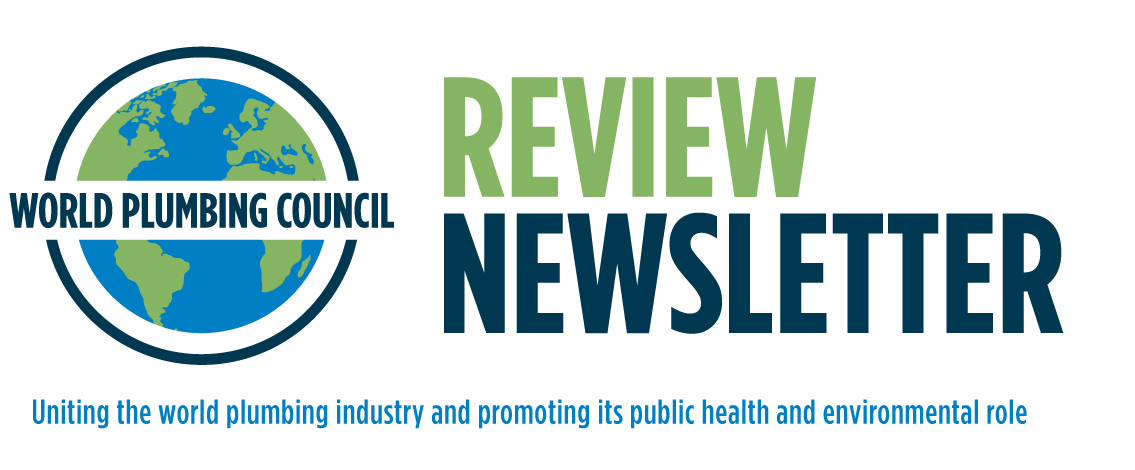
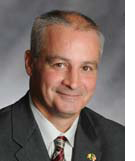 Dear WPC members,
Dear WPC members,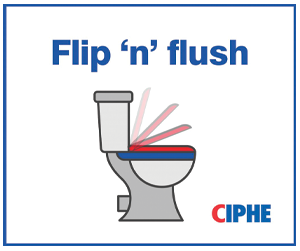 While we’ve all gotten really good at washing our hands of late, there are some extra precautions we can take to help stop the spread of germs and disease. With our understanding of coronavirus transmission growing, we are now being urged to “flip ‘n’ flush” when it comes to using the toilet.
While we’ve all gotten really good at washing our hands of late, there are some extra precautions we can take to help stop the spread of germs and disease. With our understanding of coronavirus transmission growing, we are now being urged to “flip ‘n’ flush” when it comes to using the toilet.